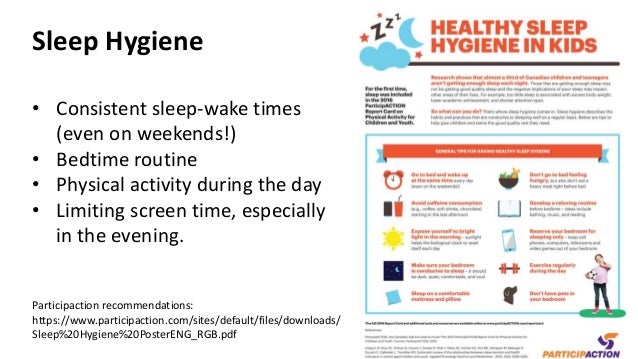Good sleep hygiene practices in children are also of benefit to the parent – this is specifically relevant when dealing with very young children. When all is said and done, a child who cannot perform at an optimum level, especially at school becomes a problem for parents and sometimes even an entire community in the long term. Walking the viewer through sleep hygiene, this is one in a series of educational and skills based videos that can be used in all settings and can be accessed.
Studies show that setting up good sleep hygiene or sleep habits could help most children and improve their quality of life the next day. Below are some tips you could start with your child's special situation. First, we need to realize that children of different ages require different amounts of sleep.

OK, you know sleep hygiene is important for kids. So, what do you do when your toddler is resisting going to bed on time or your teenager says you’re ruining their life because they can’t take their phone to bed?

Whenever setting boundaries is challenging, remember this: kids actually crave limits. By maintaining clear limits, you’re letting them know what to expect, which helps them feel safe and secure. If the expectations keep changing, they may feel uncertain and be more likely to test you. So, try to stand firm.
Sleep Hygiene For Preschoolers
Tips for setting limits to promote good sleeping habits:
Sleep Hygiene For Kids Handout

Sleep Hygiene For Kids Infographic

What Is A Good Sleep Hygiene
- For toddlers: If you’re working on independent sleep, be consistent by bringing your child back to their room every time they get up. Reward the behavior with something they enjoy. For example, if your child stays in their own bed for 1 night, they can earn an extra bedtime story the next night.
- For toddlers and younger school-age kids: Offer a limited number of “bedtime passes” that can be used for water refills, questions, toy requests and all of the other creative reasons kids come up with to get out of bed. When the passes have been used, they’re gone until the next night. (But, of course, use your judgment to make any exceptions, such as using the bathroom.)
- For older kids and teens: Try plugging phones and other devices into a family charging station 1 hour before bedtime—no exceptions. And instead of relying on phones for alarms, try going old school with an actual alarm clock.